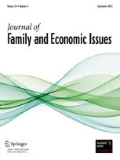Abstract
Using a qualitative approach, this study explored the experiences of African American women in Milwaukee, WI as they transitioned from welfare to work and the barriers and challenges that impeded their movement to a position of economic self-sufficiency. The study also sought the perspectives of employers on their experiences with post-welfare African American women in the workplace. The study found three systems of barriers to impede the women’s progress. These barriers were the work-first philosophy and case management practices at the local level, labor market conditions and employment practices, and personal history and responsibility. These findings suggest that any reform effort must address both the personal and structural barriers that inhibit movement towards economic self-sufficiency.
Similar content being viewed by others
References
Albelda, R. (2000). What’s wrong with welfare to work? Reality check for legislators about mothers in the low and no wage workforce? Dollars & Sense. Retrieved on August 20, 2003, from http://www.findarticles.com/cf_0/m2548/2000/Sept/65651911/print.jhtml
D. J. Besharov P. Germanis (2000) ArticleTitleWelfare reform—four years later The Public Interest 140 17–35
M. Bok L. Simmons (2002) ArticleTitlePost-welfare reform, low-income families, and the dissolution of the safety net Journal of Family and Economic Issues 23 217–238 Occurrence Handle10.1023/A:1020391009561
S. Brauner P. Loprest (1999) Where are they now? What states’ studies of people who left welfare tell us. New Federalism: Issues and Options for States. Paper Series A. No. A-32 The Urban Institute Washington, DC
Carroll, D. (2001). What do we know about CalWORKS recipients? Welfare Reform Update, Sacramento, CA: California Budget Project. Retrieved September 9, 2003 from http://www.cbp.org/2001/0107/wel6.html
D. M. Chovanec (1996) Doing interpretive research in a technocratic age: A clash of paradigms H. Reno M. Witte (Eds) Proceedings of the 37th Annual Adult Education Research Conference University of South Florida Tampa, FL 55–60
J. E. Cote C. G. Levin (2002) Identity formation, agency, and culture: A social psychological synthesis Lawrence Erlbaum Associates Mahwah, NJ
K. A. Curtis (2002) ArticleTitleFinancial penalties under the temporary assistance for needy families program: Policy discourse and strategies for welfare reform Journal of Family and Economic Issues 23 239–260 Occurrence Handle10.1023/A:1020343126400
J. Ehrle K. Seefeldt K. Snyder P. McMahon (2001) Recent changes in Wisconsin’s welfare and work, childcare, and child welfare systems. State Update No. 8. Assessing the New Federalism Institute for Research on Poverty Madison, WI
R. Gordon (2001) Cruel and usual: How welfare reform punishes poor people Applied Research Center Oakland, CA
J. E. Hansan R. Morris (1999) Welfare reform, 1996–2000 Auburn House Westport, CT
H. Holzer (2000) Employers and welfare recipients in Milwaukee and other metropolitan states: Summary of findings from employer survey UCLA School of Public Policy and Research San Francisco, CA
H. Holzer M. Stoll (2000) Employer demand for welfare recipients by race Institute for Research on Poverty Madison, WI
V. J. Hotz C. H. Mullin J. K. Scholz (2002) ArticleTitleWelfare reform, employment, and advancement Focus 22 51–56
R. J. Jacobson G. Green (2000) Who’s hiring whom for what? A report on employer practices and perceptions in Wisconsin and their implications for the future of welfare reform Council on Children and Families Madison, WI
L. Martin M. Alfred (2002) What employers and W-2 experts think about retention and advancement barriers and services Department of Workforce Development Madison, WI
L. M. Mead (2002) ArticleTitleWelfare reform: The institutional dimension Focus 22 39–46
K. J. Neubeck N. A. Cazenave (2002) Welfare racism and its consequences: The demise of AFDC and the return of the states’ rights era F. F. Piven J. Acker M. Hallock S Morgen (Eds) Work, welfare, and politics: Confronting poverty in the wake of welfare reform University of Oregon Press Eugene, OR 19–34
B. R. Ragins (1995) Diversity, power, and mentorship in organizations: A cultural, structural, and behavioral perspective M. M. Chemers S. Oskamp M. A. Costanzo (Eds) Diversity in organizations: New perspectives for a changing workplace SAGE Thousand Oaks, CA 91–132
S. Savner (2000) ArticleTitleWelfare reform and racial/ethnic minorities: The questions to ask Race & Poverty 9 3–5
S. F. Schram J. Soss R. C. Fording (2003) Race and the politics of welfare reform The University of Michigan Press Ann Arbor, MI
Scott, E. K., (2000). Looking to the future: Welfare-reliant women talk about their job aspirations in the context of welfare reform. Journal of Social Work. Retrieved August 19, 2003, from http://findarticles.com/cf_0m0341/4_56/70460023/print.jhtml
J. Soss S. F. Schram T. P. Vartanian E. O’Brien (2003) The hard line and the color line: Race, welfare, and the roots of get-tough reform S. F. Schram J. Soss R. C. Fording (Eds) Race and the politics of welfare reform The University of Michigan Press Ann Arbor 225–253
InstitutionalAuthorNameUnited States House of Representatives, Committee on Ways and Means (2000) Green Book US Government Printing Office Washington, DC
M. Wavelet M. Anderson (2002) ArticleTitlePromoting self-sufficiency: What we know about sustaining employment and increasing income among welfare recipients and the working poor Focus 22 56–61
Wisconsin Department of Workforce Development. (2001). An evaluation: Wisconsin Works (W-2) Program. Retrieved June 6, 2003, from http://www.legis.state.wi.us/lab/windex.htm
Author information
Authors and Affiliations
Corresponding author
Additional information
The Institute for Excellence in Urban Education, School of Education, University of Wisconsin-Milwaukee provided the funding for this research project.
Rights and permissions
About this article
Cite this article
Alfred, M.V. Does Wisconsin Works Work? Perspectives of Participating Women and their Employers. J Fam Econ Iss 26, 345–370 (2005). https://doi.org/10.1007/s10834-005-5902-9
Issue Date:
DOI: https://doi.org/10.1007/s10834-005-5902-9



